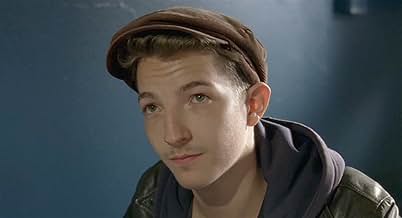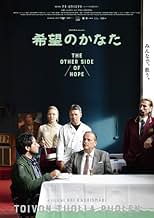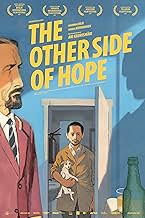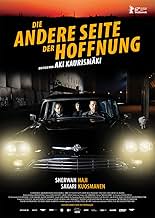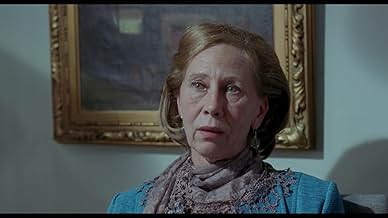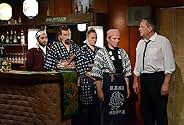AVALIAÇÃO DA IMDb
7,2/10
14 mil
SUA AVALIAÇÃO
Um dono de restaurante, jogador de pôquer e ex-caixeiro-viajante, faz amizade com um grupo de refugiados recém-chegados à Finlândia.Um dono de restaurante, jogador de pôquer e ex-caixeiro-viajante, faz amizade com um grupo de refugiados recém-chegados à Finlândia.Um dono de restaurante, jogador de pôquer e ex-caixeiro-viajante, faz amizade com um grupo de refugiados recém-chegados à Finlândia.
- Prêmios
- 8 vitórias e 24 indicações no total
Abdi Jama
- Aseman kassa
- (as Abdi alias 'Lii' Jama)
Simon Al-Bazoon
- Mazdak
- (as Simon Hussein Al-Bazoon)
Avaliações em destaque
After 'Le Havre', this is Kaurismäki's second film about refugees. This is a hot topic, now even more than ever. Europe is still trying to digest the influx of refugees from Syria and Iraq, a process with major political consequences.
There is no doubt about Kaurismäki's moral position. The lead characters in 'The other side of hope' don't even discuss if they should help the Syrian refugee Khaled, they just do it as if there is no other choice. In perhaps Kaurismäki's most political scene ever, a police officer tells Khaled that Aleppo, the city where he came from, is not unsafe according to the Finnish immigration authority, so he should be deported back to Syria. Immediately after the verdict, Kaurismäki shows a news report on Finnish television about the atrocities going on in Aleppo.
The complete lack of emotions, a trademark feature of Kaurismäki's work, adds an extra dimension to the message. The refugee doesn't complain, his protectors don't discuss, the violent racists don't explain. Everything just happens.
Of course, this being a Kaurismäki film, there are the typical elements of his movies: the fifties aesthetics, the deadpan humor, the stripped-to-the-bone dialogue. Music is also an important element in this film. It is, without exception, source music from musicians playing in bars, café's or in the street. It is all sung in Finnish, but has a very bluesy feeling, perfectly matching the overall mood of the film.
The screenplay has a special structure: for the most part of the film, the viewer is watching two separate stories. One is about the refugee Khaled entering the country as a stowaway in a cargo ship, trying to find his way in society and being processed by the immigration authority. The other is about a business man trying to revive an unprofitable restaurant. Of course, the two are destined to run into each other.
Kaurismäki is one of those film makers whose style is unique and doesn't resemble anything else. For that reason alone, his work is worth watching. In this film, he adds a political message which is as urgent as can be.
There is no doubt about Kaurismäki's moral position. The lead characters in 'The other side of hope' don't even discuss if they should help the Syrian refugee Khaled, they just do it as if there is no other choice. In perhaps Kaurismäki's most political scene ever, a police officer tells Khaled that Aleppo, the city where he came from, is not unsafe according to the Finnish immigration authority, so he should be deported back to Syria. Immediately after the verdict, Kaurismäki shows a news report on Finnish television about the atrocities going on in Aleppo.
The complete lack of emotions, a trademark feature of Kaurismäki's work, adds an extra dimension to the message. The refugee doesn't complain, his protectors don't discuss, the violent racists don't explain. Everything just happens.
Of course, this being a Kaurismäki film, there are the typical elements of his movies: the fifties aesthetics, the deadpan humor, the stripped-to-the-bone dialogue. Music is also an important element in this film. It is, without exception, source music from musicians playing in bars, café's or in the street. It is all sung in Finnish, but has a very bluesy feeling, perfectly matching the overall mood of the film.
The screenplay has a special structure: for the most part of the film, the viewer is watching two separate stories. One is about the refugee Khaled entering the country as a stowaway in a cargo ship, trying to find his way in society and being processed by the immigration authority. The other is about a business man trying to revive an unprofitable restaurant. Of course, the two are destined to run into each other.
Kaurismäki is one of those film makers whose style is unique and doesn't resemble anything else. For that reason alone, his work is worth watching. In this film, he adds a political message which is as urgent as can be.
Aki Kaurismäki's film 'The Other Side of Hope' is really two films in one: the first, a deadly serious look at the life of a Syrain refugee in Finland, and the other, a deadpan comic look at the escapades of an unlikely restauranteur. Oddly, it works, with its direct abutment of light and shade, and its playful treatment of the legendary Finish characteristic of taciturnity. A nice element of the movie is it's use of music as a symbol of our common humanity. It's a simple film, but I liked it.
There's no doubt about it, Aki is back once again with a wonderful film. "The Other Side of Hope" basically tells two stories. First there's an older Finnish man who opens a small restaurant. And then there's a Syrian man who finds his way to Finland in order to start a new life. As you can probably guess, these two stories find a way to connect. And in a surprisingly good and heartwarming way.
It was interesting to see the two cultures interact with each other. I love the kindness that so many characters bring with them. The film finds an excellent way to mix humour with drama while also bringing up some relevant issues. Many of the restaurant scenes are very funny and they made me laugh. While other scenes like when a character plays music from his homeland one final time before being deported almost brought a little tear to my eye. The entire thing is still packed with all the classic Kaurismäki elements. You can almost do a drinking game; "Point out all of Aki's personal tropes". I have to say that some of my favorite parts were whenever they were trying to change the restaurant in order to fit in with the modern times. It was almost metaphorical. It's like the filmmakers themselves had never changed, but the world around them did.
Timo Salminen's cinematography is on point with excellent use of framing and colors. I admire that they still use film instead of digital. Aki is very similar to Tarantino in that subject. He has said that if they weren't able to use film he would stop making movies all together. I hope this is not his final movie. I feel like he has many stories left to tell. I'll be here waiting for whenever a new one comes out, because I never get tired of the personality that comes with his work.
It was interesting to see the two cultures interact with each other. I love the kindness that so many characters bring with them. The film finds an excellent way to mix humour with drama while also bringing up some relevant issues. Many of the restaurant scenes are very funny and they made me laugh. While other scenes like when a character plays music from his homeland one final time before being deported almost brought a little tear to my eye. The entire thing is still packed with all the classic Kaurismäki elements. You can almost do a drinking game; "Point out all of Aki's personal tropes". I have to say that some of my favorite parts were whenever they were trying to change the restaurant in order to fit in with the modern times. It was almost metaphorical. It's like the filmmakers themselves had never changed, but the world around them did.
Timo Salminen's cinematography is on point with excellent use of framing and colors. I admire that they still use film instead of digital. Aki is very similar to Tarantino in that subject. He has said that if they weren't able to use film he would stop making movies all together. I hope this is not his final movie. I feel like he has many stories left to tell. I'll be here waiting for whenever a new one comes out, because I never get tired of the personality that comes with his work.
In modern-day Helsinki, the lives of two characters are followed: Waldemar (Sakari Kuosmanen) is beginning a new life as a single man and opening a new restaurant; and Khaled (Sherwan Haji) is a refugee from Allepo, Syria seeking asylum in Finland.
This film deserves credit for taking on a subject that continues to grab headlines and personalizes it. The Finns in this movie are mostly portrayed as generous and fair-minded with a few exceptions: some are seen as idiotic government bureaucrats (an international problem), and others are seen as downright nasty thugs (a bigger international problem).
The directing style by Aki Kaurismaki is in his usual style of being deliberately austere and distant with moments of dry humour. It works well mostly but there could have been room for a few moments of deeper emotion considering the subject matter.
A shocking twist at the end does give the film some jolt but the ambiguity of the situation (which is also far-fetched to a degree) is unsatisfying. Despite this, "The Other Side of Hope" is a fine film. As it focuses mostly on Khaled, Haji comes off as a very fine anchor for the movie. - dbamateurcritic
This film deserves credit for taking on a subject that continues to grab headlines and personalizes it. The Finns in this movie are mostly portrayed as generous and fair-minded with a few exceptions: some are seen as idiotic government bureaucrats (an international problem), and others are seen as downright nasty thugs (a bigger international problem).
The directing style by Aki Kaurismaki is in his usual style of being deliberately austere and distant with moments of dry humour. It works well mostly but there could have been room for a few moments of deeper emotion considering the subject matter.
A shocking twist at the end does give the film some jolt but the ambiguity of the situation (which is also far-fetched to a degree) is unsatisfying. Despite this, "The Other Side of Hope" is a fine film. As it focuses mostly on Khaled, Haji comes off as a very fine anchor for the movie. - dbamateurcritic
The Other Side of Hope tackles a timely matter, the refugee crisis in Europe in the wake of the ISIL wars, with a wry and deadpan sense of humour, resulting in a product with a lot of personality and colour. It's a Finnish film that received international attention but doesn't present the Finns themselves in a totally positive light- but then, we know the Finns haven't been the only ones to show a complete lack of humanity and empathy towards those who've suffered so much.
The film boasts a number of memorable characters, particularly Waldemar Wikström, who purchases a restaurant called The Golden Pint while looking for a new line of work after a separation. A profitable business, he is told, because people drink when times are bad, and more when times are good. He finds himself leading a staff of three Finns, then a dog, and finally Khaled, a Syrian refugee only looking for his sister. Wikström brings Khaled in after the courts decide, rather dubiously, that there is no war in Aleppo.
The Other Side of Hope isn't naive in imagining a harmonious outcome for everyone. It brings us a vision of hardships that nevertheless, with its humour and hope, inspires, and brings a smile to the face.
The film boasts a number of memorable characters, particularly Waldemar Wikström, who purchases a restaurant called The Golden Pint while looking for a new line of work after a separation. A profitable business, he is told, because people drink when times are bad, and more when times are good. He finds himself leading a staff of three Finns, then a dog, and finally Khaled, a Syrian refugee only looking for his sister. Wikström brings Khaled in after the courts decide, rather dubiously, that there is no war in Aleppo.
The Other Side of Hope isn't naive in imagining a harmonious outcome for everyone. It brings us a vision of hardships that nevertheless, with its humour and hope, inspires, and brings a smile to the face.
Você sabia?
- CuriosidadesThe actors playing siblings Khaled and Miriam are real-life siblings.
- ConexõesFeatured in Ismo Haavisto One Man Band: Midnight Man (2017)
- Trilhas sonorasOi mutsi, mutsi
Written and performed by Tuomari Nurmio
Principais escolhas
Faça login para avaliar e ver a lista de recomendações personalizadas
- How long is The Other Side of Hope?Fornecido pela Alexa
Detalhes
- Data de lançamento
- Países de origem
- Centrais de atendimento oficiais
- Idiomas
- Também conhecido como
- The Other Side of Hope
- Locações de filme
- Helsinque, Finlândia(The city)
- Empresas de produção
- Consulte mais créditos da empresa na IMDbPro
Bilheteria
- Orçamento
- € 1.600.000 (estimativa)
- Faturamento bruto nos EUA e Canadá
- US$ 183.943
- Fim de semana de estreia nos EUA e Canadá
- US$ 15.495
- 3 de dez. de 2017
- Faturamento bruto mundial
- US$ 4.282.973
- Tempo de duração1 hora 40 minutos
- Cor
- Mixagem de som
- Proporção
- 1.85 : 1
Contribua para esta página
Sugerir uma alteração ou adicionar conteúdo ausente

Principal brecha
By what name was O Outro Lado da Esperança (2017) officially released in India in English?
Responda

